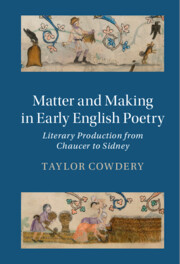Book contents
- Matter and Making in Early English Poetry
- Cambridge Studies in Medieval Literature
- Matter and Making in Early English Poetry
- Copyright page
- Contents
- Acknowledgments
- Abbreviations and Editorial Conventions
- Introduction
- Chapter 1 Words and Deeds in Chaucer
- Chapter 2 Gower and the Crying Voice
- Chapter 3 Hoccleve and the Force of Literature
- Chapter 4 Lydgate and the Surplus of History
- Chapter 5 Copy and Copia in Skelton
- Chapter 6 Wyatt’s Grace
- Epilogue
- Notes
- Bibliography
- Index
- Cambridge Studies in Medieval Literature
Chapter 1 - Words and Deeds in Chaucer
Published online by Cambridge University Press: 15 June 2023
- Matter and Making in Early English Poetry
- Cambridge Studies in Medieval Literature
- Matter and Making in Early English Poetry
- Copyright page
- Contents
- Acknowledgments
- Abbreviations and Editorial Conventions
- Introduction
- Chapter 1 Words and Deeds in Chaucer
- Chapter 2 Gower and the Crying Voice
- Chapter 3 Hoccleve and the Force of Literature
- Chapter 4 Lydgate and the Surplus of History
- Chapter 5 Copy and Copia in Skelton
- Chapter 6 Wyatt’s Grace
- Epilogue
- Notes
- Bibliography
- Index
- Cambridge Studies in Medieval Literature
Summary
Throughout his work, Geoffrey Chaucer often returns to a well-known medieval commonplace: that “words” should be “cosyn” to the “deeds” they denote. After tracing the history of this commonplace and noting its prominence in fourteenth-century legal, philosophical, and literary discourse, this chapter turns to Chaucer’s use of the dictum in his Canterbury Tales. I argue that the Tales may be read as Chaucer’s free exploration of the different kinds of deeds, or matters, to which a poet’s words might be held “cosyn.” Different pilgrims take different positions on this question throughout the Tales, and this accounts, in part, for the variety of matter and styles employed in their narratives. This variety notwithstanding, I suggest the Tales ultimately posit that the proper “deed” of literature is historical in character. Chaucer comes to this insight over the course of Fragment Seven, and he makes his boldest claim for it in the Nun’s Priest’s Tale, which suggests that poetry always retains the marks of the history that has produced its words and forms—no matter how autonomous or fictional that poetry may appear.
- Type
- Chapter
- Information
- Matter and Making in Early English PoetryLiterary Production from Chaucer to Sidney, pp. 15 - 51Publisher: Cambridge University PressPrint publication year: 2023

